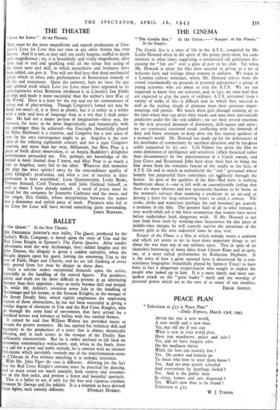" Love for Love." At the Phoenix.
THE THEATRE
This must be the most magnificent and superb production of Con- zreve's Love for Love that our own or any other theatre has ever known. And it is not, as may only too easily happen, stuffed to death with magnificence ; no, it is beautifully and vitally magnificent, alive from end to end and sparkling with all the virtue that acting of the finest taste and skill, to which naturalness and freshness have been added, can give it. You will not find here that dead mechanical polish which so often robs performances of Restoration comedy of all life and enjoyment. Quite the contrary, here we have the gay and spirited work which Love for Love must have appeared to its contemporaries when Betterton produced it in Lincoln's Inn Fields in 1695 and made it more successful than the author's later Way of the World. Here is a feast fo- the eye and ear for connoisseurs of acting and of play-writing. Though Congreve's famed wit may be made too much of, it is there in plenty, but it is rather as a writer with a style and love of language than as a wit that I shall praise him. He had not a major portion of imagination—there was, for instance, far more to -be done linguistically and fantastically, with his astrologer than he achieved—but Foresight (beautifully played by Miles Malleson) is a creation, and Congreve has a just sense of how far his own extravagance ought to go. Angelica is the new ideal of the refining eighteenth century and not a pure Congreve creation, any more than her twin, Millamant, but Miss Prue is a piece of fresh direct observation, o: so Angela Baddeley's delightful performance persuaded me. For, perhaps, my knowledge of the period is more limited than I know, and Miss Prue is as much a type as Angelica, mere foil to the ideal. Whatever dull moments the play has were spirite 1 away by the extraordinary quality of John Gielgud's prochiction, and what a cast of masters in their profession is here assembled: Leon Quartermaine, Leslie Banks, Yvonne Arnaud, Cecil Trouncer, with John Gielgud himself, as well as those I have already named. A word of praise must be found for the costumes by Jeannette Cochrane and the music and the singer, Eric Goldie, whose interpolation between the scenes was a dexterous and stylish piece of work. Playgoers who fail to see Love for Love will have missed something quite outstanding.
JAMES REDFERN.


























 Previous page
Previous page